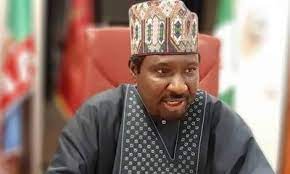The Secretary to the Government of the Federation, Mr. Boss Mustapha, in this interview, explains the dynamics of his office, its interface with the larger bureaucracy and how the Buhari administration has fared in the last four years. Excerpts:
Working with six departments and 22 agencies
One of the responsibilities of the Office of the Secretary to the Government of the Federation, OSGF, is to co-ordinate policies that have been formulated by ministries, departments and agencies. Twenty-two of the agencies report directly to the OSGF. Six permanent secretaries are charged with the responsibility of overseeing these offices. It’s quite a lot of responsibility to co-ordinate government policies and to ensure their implementation. We have been able to handle it accordingly. These offices provide the secretariat for the Council of State, Federal Executive Council and other committees chaired by Mr President.
Also, we ensure that not only does government formulate policies but that they are properly implemented. We provide secretariat services to track policies, projects and programmes that have been approved and programmes that have been put in place to ensure that the policies are being implemented. There is a whole lot that takes place here. Generally, we provide co-ordination for government and we ensure that government does not work at cross-purposes; that synergies are provided and they inter-link.
Relationship and synergy with state governments
When I assumed office November 2017, I realized that there is a statutory meeting that used to hold between the OSGF and those of the 36 states which has not been taking place for a couple of years. So I set out to revive that meeting because it is strategic. Whatever policy is formulated at the federal level; if it does not cascade to the states, you will have a disconnect. That meeting now takes place on quarterly basis.
That meeting provided us with a platform where we shared ideas, experiences of how things were done in different states and a lot of states began to learn from the experiences of others. So, it became like a platform for peer review for us and I believe that has helped us tremendously to create synergy.
We didn’t stop there. Since we provide secretariat services to the Federal Executive Council, we decided to extend it to the cabinet affairs offices of the various states. And we develop a handbook on how to manage a cabinet affairs office which was launched a couple of months ago. So my colleagues in this office get at least a link between the federal and state governments for the purposes of pushing the change agenda.
State governments realize that so much was going on at the federal level that states were not appropriately benefitting from. For example, when we got the Central Bank to speak about the Anchor Borrowers Scheme, a lot of the secretaries to the government at the state were amazed that there was so much money available that their people could access.
When we started to talk about the school feeding programme, a lot of them were reluctant. They asked: what are you talking about? Did such a thing happen? Some states that had logged into that programme began to explain what was happening in terms of school enrolment with the nutrition and health of the children as a result of the school feeding programme.
Initially, the perception was that this is a political move to have a hold in the states, but by the time they realized that it was for the benefit of their people, they jumped in to be on the truck.
Political differences as hinderance
When we started, we went to Adamawa, which was an APC-controlled state. The next state that offered to host us was Akwa Ibom which was a PDP- controlled state. I was in Uyo for two days and the governor was extremely generous in his support for the meeting and subsequently we have gone to different places.
In the OSGF, you have the Special Services Office which provides the secretariat to the office of the National Security Adviser. It deals with security matters. We have a meeting of permanent secretaries at the different levels of different states with their permanent secretaries that oversee that there will be synergy in dealing with security matters of this country.
So we try as much as possible to create that synergy by having this office co-ordinate a routine meeting as often as possible, sometimes monthly, sometimes quarterly depending on the need, so that we can discuss the security implications of what is happening all over the country.
We are being threatened by different dimensions of security challenges. So, this office is supposed to co-ordinate that, provide information, logistics support in terms of intelligence with the different components of our nation so that we can effectively deal with the security challenges.
Concord among tiers government, especially NASS
The National Assembly is a key partner because whatever government wants to do, anywhere in the world, it definitely needs the partnership of the legislature. Upon assumption of office, I went to the National Assembly to knock at the door of the Senate President and the Honorable Speaker of the House Representatives. I extended a hand of fellowship and partnership and I said `look you know that we can’t do this business alone; we need your support, in as much as whatever we want to do we need money to be able to do that.’ We submit the expense to the National Assembly but the power of appropriation is vested in the National Assembly. If they don’t appropriate, we can’t even expend the money.
The president has signed a couple of executive orders but the executive orders are different from proper legislations that will drive policies, create establishment or agencies to push a particular agenda. So, you need the legislature. I have tried as much as possible to do what needs to be done with the legislature and even the judiciary so that we have all the relationships that are mutually beneficial to all.
The new guidelines from the Nigerian Financial Intelligence Unit
When President Obasanjo came on board in 1999, he decided that funds that are for the local governments would go straight to local government accounts that were opened at the Central Bank. That was the share of revenue that is distributed after every federation account meeting and they were getting their money until Lagos state felt it was unconstitutional and you know the story.
The current vice president, who was the attorney general in Lagos state, went to court and got the other states to support them until the Supreme Court which decided that all local governments are part of the state, that the administration of their funds is vested in the House of Assembly of their states. And it was at that point those accounts that were opened in Central Bank were closed and now a unit within the office of the commissioner for local government was set up to administer local government funds through the Joint Local Government Accounts.
So, whatever is approved for the local governments is normally sent directly to the states and it goes into that account owned jointly between the local government and the state. They decide according to state laws as passed by the Houses of Assembly on how the funds are appropriated.
Part of the resistance that is coming from them is – are you not taking us back to those days where you think the local government account does not have to be administered with the intervention of the state; that is what I think we need to manage very well.
The NFIU law empowers them to monitor withdrawals, movements of funds, everything that deals with finances as it affects our nation. We have to keep watch on the movement of funds all over the world. The tendency is for government to be interested on how funds are used because funds have become instrument of destabilization in most countries.
So, it is important that as Nigerians we follow up and keep in mind how funds are moved within the system. It can destabilize the economy, security architecture of the nation. So we have to be very careful and that unit that used to be part of the EFCC has now receded and it is now trying to do its job.
Evaluating Buhari on three key promises
We President Buhari assumed office, 22 of 27 local governments in the North-east were under Boko Haram insurgents. Today, not a single of those 22 local governments are under Boko Haram. But we are not completely out of the woods yet.
We have had incidents of banditry which have taken a new dimension altogether. It is no more kidnapping just for the sake of it. Kidnapping is becoming a commercial enterprise and the banditry in the North-west, if care is not taken, will be another insurgency because they come in and take territories and declare lordship over those territories and they dare even authorities and securities agencies.



